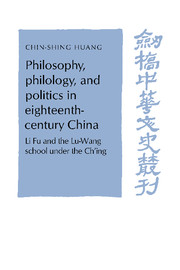 Philosophy, Philology, and Politics in Eighteenth-Century China
Philosophy, Philology, and Politics in Eighteenth-Century China Book contents
- Frontmatter
- Contents
- Foreword by Professor Ying-shih Yü
- Acknowledgments
- Abbreviations
- Introduction
- 1 The original argument (1): “Chu Hsi versus Lu Hsiang-shan” (Chu-Lu i-t'ung): A philosophical interpretation
- 2 The original argument (2): Wang Yang-ming and the problematic of “Chu Hsi versus Lu Hsiang-shan”
- 3 The critical dimension in the Confucian mode of thinking: The conception of the Way as the basis for criticism of the political establishment
- 4 Li Fu: an exemplary Lu-Wang scholar in the Ch'ing dynasty (1): His life
- 5 Li Fu: an exemplary Lu-Wang scholar in the Ch'ing dynasty (2): His thought
- 6 Li Fu and the philological turn
- 7 The price of having a sage-emperor: the assimilation of the tradition of the Way by the political establishment in the light of the K'ang-hsi emperor's governance
- Conclusion
- Chinese glossary
- Bibliography
- Index
3 - The critical dimension in the Confucian mode of thinking: The conception of the Way as the basis for criticism of the political establishment
Published online by Cambridge University Press: 17 September 2009
- Frontmatter
- Contents
- Foreword by Professor Ying-shih Yü
- Acknowledgments
- Abbreviations
- Introduction
- 1 The original argument (1): “Chu Hsi versus Lu Hsiang-shan” (Chu-Lu i-t'ung): A philosophical interpretation
- 2 The original argument (2): Wang Yang-ming and the problematic of “Chu Hsi versus Lu Hsiang-shan”
- 3 The critical dimension in the Confucian mode of thinking: The conception of the Way as the basis for criticism of the political establishment
- 4 Li Fu: an exemplary Lu-Wang scholar in the Ch'ing dynasty (1): His life
- 5 Li Fu: an exemplary Lu-Wang scholar in the Ch'ing dynasty (2): His thought
- 6 Li Fu and the philological turn
- 7 The price of having a sage-emperor: the assimilation of the tradition of the Way by the political establishment in the light of the K'ang-hsi emperor's governance
- Conclusion
- Chinese glossary
- Bibliography
- Index
Summary
In his publications, Professor Ying-shih Yü explores the significance of the “philosophical breakthrough” of Chinese intellectual development since the time of Confucius. One crucial point elucidated by Professor Yü is that a tension between the tradition of the Way and the political establishment had emerged because of the breakdown of feudalism during the Eastern Chou. In the Western Chou, ritual and music in themselves were thought to embody the Way. But as feudalism declined, the practice of ritual and music began to decline along with the political system that fostered them. Knowledge needed to implement ritual and musical practices, which was previously in the hands of central political authorities (then, supposedly the Chou family) shifted to newly rising private scholars. It was Confucius (551–479 b.c.) who associated the newly emerging intellectual group with the great mission to inherit and defend the Way (tao). Devoted and committed to preserving and reviving the cultural tradition, Confucius redefined the term “intellectual” (shih). Confucius divested shih of its former social and political designation within a feudalistic structure as the lowest class of noblemen. At the same time, he gave the term shih in its relation to the Way a new meaning: the bearer of the Way.
From then on, the ideal intellectual (shih) or gentleman (chün-tzu) was expected to embody the Way – to speak for it and act on it. Thus, for the intellectuals, there appeared a new criterion of political and moral conduct.
- Type
- Chapter
- Information
- Philosophy, Philology, and Politics in Eighteenth-Century ChinaLi Fu and the Lu-Wang School under the Ch'ing, pp. 47 - 62Publisher: Cambridge University PressPrint publication year: 1995


